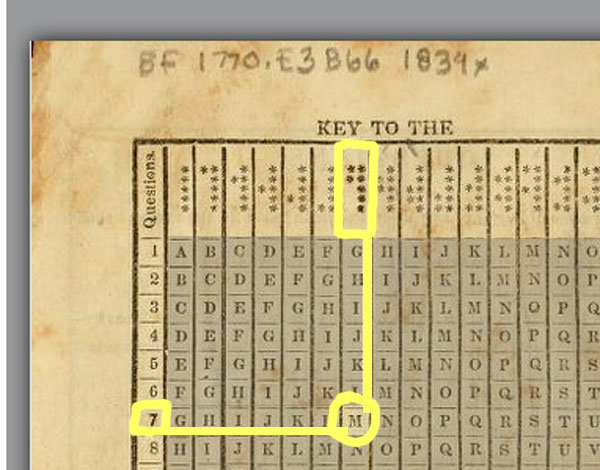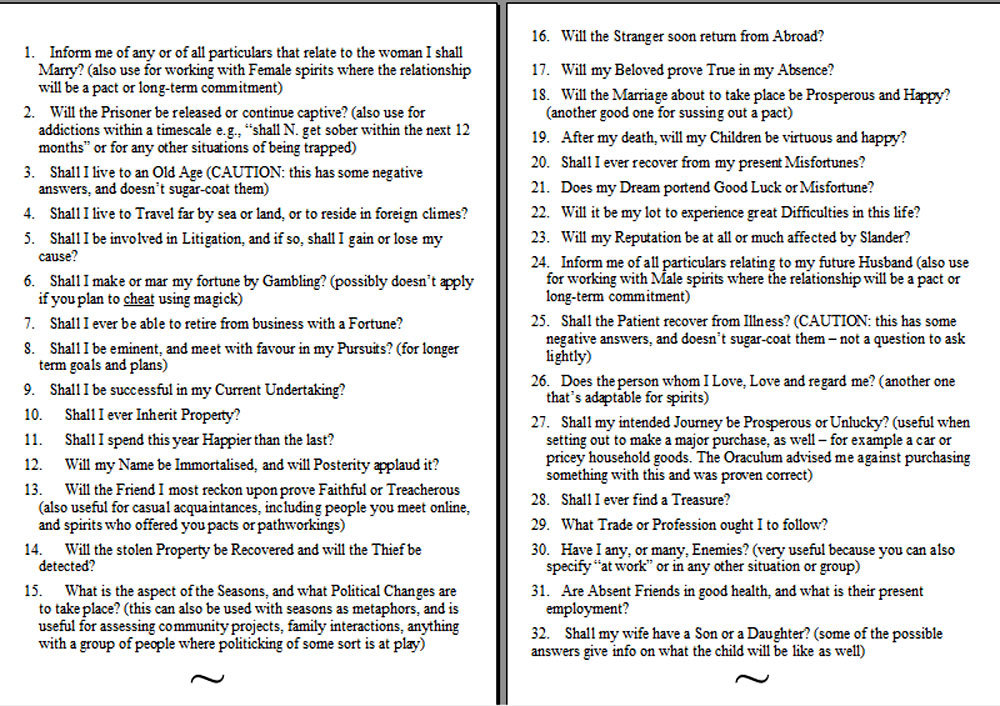Napoleon’s Book Of Fate, also called the Oraculum, is a form of oracle whose questions and answers are remarkably pragmatic and direct.
I’m posting this as a tutorial on how to use it, and to cover some common shorthand the Books uses and background info, because it’s a tool that can be used by just about anyone regardless of psychic sensitivity or magickal ability, since it gives the answers in a text format - in that respect it’s more like the I Ching than using a tool like Tarot.
2020 Update:
I posted this tutorial in 2014, so a lot has become clearer over the years and with the experiences of many dedicated mages and students of divination all giving their feedback, as well as my own use of the Book.
The Book of Fate seems to give the most accurate results on matters of personal/workplace politics, personal ambition, careers, and matters of that nature, and be least reliable in matters of love, possibly due to different attitudes to extra-marital sex and romance in the era it was originally created.
Most methods of divination have an average 80% accuracy rate at their best, due to various factors, and the 20% failure rate of this Oracle have largely been reported in the area of romantic love.
Please bear this in mind before consulting it.
Original 2014 post resumes:
First, this is the story behind the Book:
"The Oraculum had been originally discovered in one of the Royal tombs of Egypt during a French military expedition of 1801, and at Napoleon’s request was translated by a famous German scholar and antiquarian. Apparently consulting it “before every important occasion”, the book became one of the emperor’s most treasured possessions. It was found among his personal possessions after the defeat of his army at Leipzig in 1813 and translated into English in 1822."
The legend behind it is that as long as Napoleon heeded the Book Of Fate’s guidance, his career and empire flourished - only when his ambition caused him to ignore the guidance of the Oraculum did his fortunes decline.
The questions and answers are all very pragmatic and focused, many of them to do with loyalty, business, politics, and power.
A couple of months ago, the Book Of Fate saved my dog’s life, by advising me to ignore the vet’s advice to have him put to sleep when he fell ill (I was too wrung out from sleepless nights with him to be able to deploy any magick, and also too caught up in worry and so on) and it gave me some broad guidance on what to do (seek more information) which worked, and he made a full recovery - not the first time it’s helped, but certainly the most significant.
Important point - be aware that each question has 32 possible replies, and that Q’s 3 & 25, length of life and recovery from sickness, do have potentially negative replies (one answer for #25 tells the querent to prepare their tomb!) so a word of caution applies with those, and please don’t ask either of those if you believe a negative answer will adversely affect you in any way.
Also, don’t ask the Book Of Fate the same question twice within any calendar month, and ideally, don’t ask it more than one question per day about anything.
How to use the Book Of Fate:
You can do a reading by going to this page and reading the instructions, first:
http://publicdomainreview.org/collections/napoleons-oraculum-1839/
There’s a list of the questions with my notes added to how else they can be applied for magickal purposes here:
Here’s how to use it, once you picked your question:
Take a sheet of paper (or notebook, whatever you prefer) and put the date and the question, plus the number for that question (that’s important) at the top.
Then underneath, write five rows of lines, just do a load of them right across the paper without counting. The book’s instructions say to do more than 12 but unless you leave big gaps or use a tiny piece of paper, you don’t need to count TO twelve at the start, I never do.
If you feel a strong STOP feeling, then stop, DON’T go too fast writing those lines because you want to be in tune with that, but if you feel nothing that’s perfectly okay (it happens on some readings for me, and it doesn’t affect the result) and just keep going to the end of the sheet of paper.
Sometimes, I’ve kept going right to the end of the paper and my pen slipped so it scratched down the side of the pad - in those cases I either discarded the reading if it was very important and tried again the next day, or I counted the visible lines only, and those answers were always accurate when I checked back afterwards.
If you have trouble not counting, try repeating the question to yourself as you work, or hum a tune or something to keep your mind from going “One-two-three-four…”! ![]()
So what you have should look a bit like this, as a rough example - five sets of vertical lines:
| | | | | | | | | | | | | | | | | |
| | | | | | | | | | | | | | | | | | | |
| | | | | | | | | | | | | | | | | | |
| | | | | | | | | | | | | | | | | | | | |
| | | | | | | | | | | | | | | | | | |
Add the lines up, I like to make a tiny cross-line on them so if I lose count or my lines were messy I know where I got to, then then if it’s an odd number, it’s one dot, if it’s an even number, it’s two dots:
18 lines would be **
20 lines would be **
19 lines would be *
21 lines would be * … etc.
Start at the top (unlike the I Ching) so in my example there, you got 18 on the top line, 20 on the 2nd, and so on.
Then cross reference the number of the question, in the vertical column on that double page with the grid on, and trace down from the exact symbol (make sure you get the right on, maybe use a piece of paper or ruler) to find the alphabetical (or symbol) of the page.
Find that page, skim until you find the symbol made from the pattern of dots you got, and that’s your answer. It’s very simple once you get the hang of it, far more so that reading about it in fact!! ![]()
Say you ask Question 7, and the result you get looks like this:
**
**
*
*
*
You go to the page with the key grid on the online version, the one that’s two clicks in, on the > arrow.
You’ll see a grid with all the ** symbols along the top, and down the side, the numbers, which denote which question.
Look up the symbol you got along the top, then the number of the question down the side, like this:

You can see on that example, you need to go to Page M and then find your symbol on that page, and the answer is the text next to it.
I started using this with no idea how it worked and every answer it’s given me has been 100% reliable, and it’s become my Go To tool when I have serious questions.
Remember that the Book of Fate speaks in metaphors and simple old-fashioned terms e.g., it uses “drunkenness” to mean every type of self-destructive or unstable behaviour, probably because it was written before people were psychologically literate.
If you get an answer that really puzzles you, post here or PM me and I’ll try and shed light on it if I can, but the answers are usually fairly simple to figure out.
It’s also a very conservative-minded book and leans on the side of caution in most things - it won’t offer encouragement if it can give you some advice instead, and it tends to favour hard work over empty optimism when you want to achieve a goal.
But I’ve found it to be totally reliable regarding the trustworthiness (or otherwise) of spirits and for giving general advice, and I regularly look back over old Q & A’s to check on this - a practice I recommend (as with any divinatory tool) to rule out wishful thinking.
Finally, if you get good results and would like to find a print edition, the version I have is published by Cico Books with an introduction by Judy Hall, the ISBN is 1 903116 597 - it’s probably the best edition to track down since some of them seem to be reprints of scans of an older book that are hard to read, whereas that one is nicely typeset and comes with a modern introduction.

